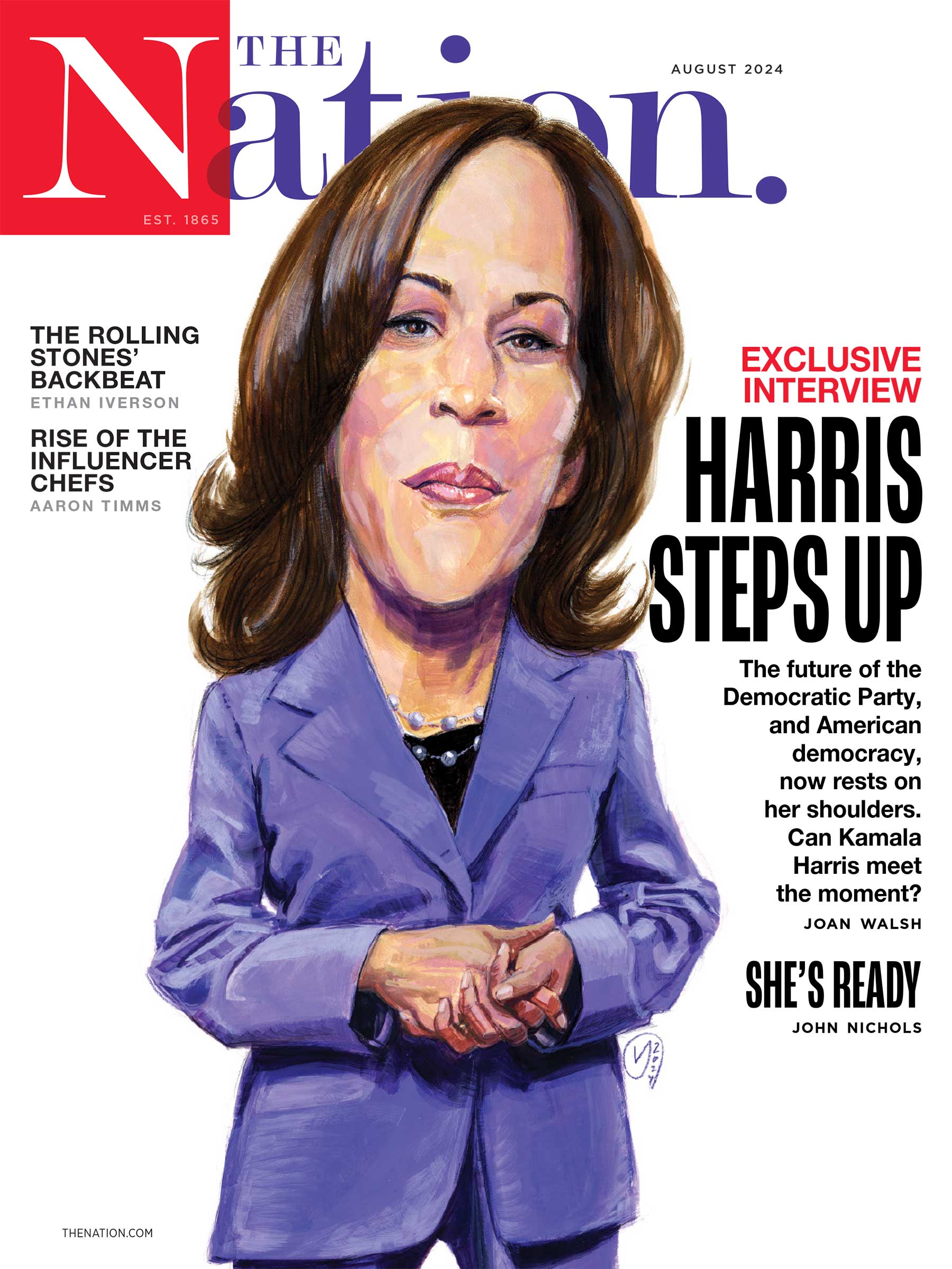Politics
/
August 13, 2024
Trump’s obsession with crowd size is part of his constant quest to keep reality from getting in the way of his success.

A section of empty seats at an event hosted by former President Donald Trump in Commerce, Georgia, on March 26, 2022.
(Elijah Nouvelage/Bloomberg via Getty Images)
Donald Trump’s obsession with the size of the crowd that showed up for the Harris-Walz nomination speaks volumes about the waning momentum behind his third presidential run, but not in the way many commentators have suggested. Truth Social’s outburst this weekend, claiming that the crowd that greeted Kamala Harris and Tim Walz at the Detroit airport was conjured by artificial intelligence, represents an early attempt to discredit the presidential election in advance, it writes Washington Post analyst Philip Bump, a prelude to another insurrection on January 6, should Trump lose again. Meanwhile, Trump’s detractors on social media have suggested that the candidate’s evidence-free attack on the reality of Democratic rallies represents his continued descent into dementia and delusion, with some comparing the candidate to Captain Queeg, the deranged Navy officer played by Humphrey Bogart in The Caine Mutiny.
It is true that Trump is showing even greater signs of mental decline than usual, just as it is true that the Trump campaign’s plans to delegitimize and overturn an adverse election result are painfully advanced since the January 6 coup. But neither the candidate’s losing battle with old age nor the prospect of another post-election coup attempt explains the depth of Trump’s fixation with crowd numbers. The kind of delusion Trump is now indulging in has been part of his character since the beginning of his tabloid-fueled rise to public prominence. Far from representing a new detour into paranoid fantasies, it marks the most coherent belief system the 45th president holds: the gospel of positive thinking.
For all his prophecies of national decline, Trump is an apostle of Norman Vincent Peale’s theology of modern self-improvement, as expounded in the Protestant cleric’s 1952 best-selling book, The Power of Positive Thinking. As a child, Trump regularly attended Peale’s weekly sermons at the congregation of Marble Collegiate in Manhattan. Peale officiated at Trump’s first wedding in 1977, and Trump has cited the seminal influence of Peale’s teachings throughout his life.
Current number

How do you translate the core tenets of Pealeism into something as crazy as Trump’s belief that the massive crowds flocking to his Democratic rivals are a technologically manipulated mirage? The basic idea is simple: Peale preached that the key to success was to chant a steady stream of motivational mantras, usually ripped from any recognizable context in the Bible, as a way to ensure self-advancement. In the parlance of today’s self-help industry, Peale taught believers that manifesting their material well-being was the surest path to an abundant, God-ordained life of ease. “Picturize, prayize, and actualize” was Peale’s mantra for believers striving for growth.
Trump is a nihilist in many other ways, but he sticks to the tenets of positive thinking amid the upheavals in his personal and public life. When he sued The New York Times reporter Tim O’Brien in 2006, challenging O’Brien’s assertion that Trump’s net worth did not justify Trump’s self-designation as a billionaire, Trump explained in a deposition that he was indeed a billionaire because he felt like one most days. “I like to be as positive as possible about my holdings,” he said, before going into a fanciful account of how a 30 percent interest in one of those holdings translated into a 50 percent interest, because “I always thought I owned 50 percent.”
In his political life, the size of rally crowds similarly occupies a disproportionate place in Trump’s imagination. Early in his administration, Trump sent his then-press secretary Sean Spicer to announce to the White House press corps that Trump’s inauguration-day crowd was nothing less than “the largest crowd ever to attend an inauguration, period, both in person and around the world.”
In later self-congratulatory flourishes, Trump would claim that he had attracted a devoted following that far outnumbered the fans who flocked to see Elton John. In reality, that rally crowd was 6,500, a turnout that would likely have led to the cancellation of an Elton John tour. But the facts on the ground were not the least bit relevant to the president’s fervent depiction: “So let’s break all these records,” Trump enthused. We actually do it without, like, musical instruments. This is the only musical [sic]: the mouth. And hopefully the brain attached to the mouth.”
Nor, it should be noted, is Trump’s fixation on crowd size irrelevant to explaining his broader appeal. It was the mainstream media’s equally vacuous obsession with scale and spectacle that drove cable networks like CNN to mindlessly allocate acres of airtime to unfiltered coverage of Trump rallies during the 2016 cycle. That derogation from journalistic duty translated into an estimated $5 billion in free media for Trump by Election Day 2016. As he sees his recent anemic rallies outshone by Harris and Walz, Trump correctly senses that his 2016 gimmick is starting to wear thin, and since it is also a good-thinking article that one can bend the prevailing terms of reality to one’s success mantras, Trump is mostly frozen in horrified incomprehension in the face of new evidence. It is therefore essential that the evidence be dismissed and delegitimized; the only logical alternative in pealeism is the inadmissible thought that the positive thinker is on a self-scheduled date with failure.
This, not coincidentally, is the same logic that drove Trump to launch the false crusade to discredit the 2020 election results: it’s not that he had identified a vast Democratic conspiracy; it’s that a Trump defeat was simply unthinkable and therefore could not exist. (See also Trump’s attempt to discredit his only defeat in the 2016 Iowa primary, against Ted Cruz, with exactly the same false motivations.)
That’s why, as images of the Harris-Walz rally in Detroit rolled across the mediasphere last week, Trump called a confusing press conference at his Mar-a-Lago compound. The idiotic political desk of The New York Times they treated that performance as a standard campaign ploy to “regain attention” from the Democratic ticket, when in reality it was the typical lapse of positive-thinking dogma in the face of brutal, incontrovertible evidence to the contrary.
During that press conference, Trump went out of his way to claim that the crowd he had drawn for the infamous “Stop the Steal” rally on January 6, 2021, was larger than the crowd at Martin Luther King’s “I Have a Dream” speech on the National Mall, while also falsely insisting that “no one was killed” in the Capitol insurrection. These are dangerous and authoritarian delusions, but they are not from the GOP’s 2024 electoral subversion playbook or Trump’s descent into madness. The only thing that differentiates this round of Trump’s megalomaniacal obsessions is that he can no longer count on the likes of Sean Spicer and Jeff Zucker to emblazon them across the nation.
Can we count on you?
In the upcoming election, the fate of our democracy and basic civil rights are at stake. The conservative architects of Project 2025 are planning to institutionalize Donald Trump’s authoritarian vision at every level of government if he wins.
We have already witnessed events that fill us with both terror and cautious optimism, in all of this, The nation has been a bulwark against misinformation and a champion of bold, principled perspectives. Our dedicated writers sat down with Kamala Harris and Bernie Sanders for interviews, parsed J.D. Vance’s shallow right-wing populist appeals, and discussed the path to a Democratic victory in November.
Stories like these and the one you just read are vital at this critical moment in our country’s history. Now more than ever, we need independent, lucid, and deeply researched journalism to make sense of headlines and separate fact from fiction. Donate today and join our 160-year legacy of speaking truth to power and elevating the voices of grassroots advocates.
Throughout 2024, and in what will likely be the defining election of our lifetimes, we need your support to continue publishing the eye-opening journalism you rely on.
Thank you,
The editors of The nation
Chris Lehman
Chris Lehmann is the head of the DC office for The nation and a contributing editor at The Disconcerting. Previously he was director of THE Shocking AND The New Republicand is the author, more recently, of The Cult of Money: Capitalism, Christianity, and the Demise of the American Dream (Melville House, 2016).





